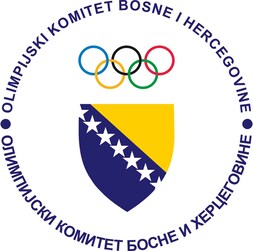
Sarajevo is the capital and largest city of Bosnia and Herzegovina, with a population of 275,524 in its administrative limits. The Sarajevo metropolitan area including Sarajevo Canton, East Sarajevo and nearby municipalities is home to 555,210 inhabitants. Located within the greater Sarajevo valley of Bosnia, it is surrounded by the Dinaric Alps and situated along the Miljacka River in the heart of the Balkans, a region of Southeastern Europe.

Bosnia and Herzegovina competed at the 2004 Summer Olympics in Athens, Greece, from 13 to 29 August 2004. This was the nation's fourth appearance at the Summer Olympics since the post-Yugoslav era.

Bobsleigh at the 1998 Winter Olympics consisted of two events at Spiral. The competition took place between February 16 and February 23, 1998.

The FIS Ski Jumping World Cup is the world's highest level of ski jumping and the FIS Ski Flying World Cup as the subdivisional part of the competition. It was founded by Torbjørn Yggeseth for the 1979/80 season and organized by the International Ski Federation. Women began competing during the 2011/12 season.

Bosnia and Herzegovina competed in the Summer Olympic Games as an independent nation for the first time at the 1992 Summer Olympics in Barcelona, Spain. Previously, Bosnian and Herzegovinian athletes competed for Yugoslavia at the Olympic Games.

Italy competed at the 1984 Winter Olympics in Sarajevo, Yugoslavia.

Athletes from the Socialist Federal Republic of Yugoslavia competed at the 1992 Winter Olympics in Albertville, France. It was the final Olympic Games for Yugoslavia under this name, which at that point consisted of Bosnia and Herzegovina, Montenegro and Serbia. Republic of Macedonia had become independent but the skier Vesna Dunimagloska participated as part of Yugoslav team.

Bosnia and Herzegovina competed in the Winter Olympic Games as an independent nation for the first time at the 1994 Winter Olympics in Lillehammer, Norway. Previously, Bosnian and Herzegovinian athletes competed for Yugoslavia at the Olympic Games.

Bosnia and Herzegovina sent a delegation to compete at the 2002 Winter Olympics in Salt Lake City, United States from 8–24 February 2002. This was the nation's third time participating in a Winter Olympic Games. The delegation consisted of two alpine skiers, Tahir Bisić and Enis Bećirbegović. Bisić finished in 29th place in the men's slalom, and 44th in the giant slalom. Bećirbegović failed to finish the giant slalom, his only event.

The Olympic Committee of Bosnia and Herzegovina is a non-profit organization representing Bosnia and Herzegovina athletes in the International Olympic Committee. The committee organizes Bosnia's representatives at the Summer and Winter Olympic Games.

Bosnia and Herzegovina sent a delegation to compete at the 2010 Winter Paralympics, in Vancouver. It fielded a single athlete, in alpine skiing.

Bosnia and Herzegovina, having become independent from the Socialist Federal Republic of Yugoslavia in 1992, made its Paralympic Games début at the 1996 Summer Paralympics in Atlanta, with merely two athletes competing in men's track and field. The country has competed in every edition of the Summer Paralympics since then, and made its Winter Paralympics début at the 2010 Winter Paralympics in Vancouver, with a single representative in alpine skiing.

Bosnia and Herzegovina competed at the 2012 Summer Olympics in London, United Kingdom from 27 July to 12 August 2012. This was the nation's sixth appearance at the Summer Olympics.

Bosnia and Herzegovina competed at the 2012 Winter Youth Olympics in Innsbruck, Austria. The Bosnia and Herzegovina team consisted of 4 athletes in 3 sports. It did not win any medals.

Bosnia and Herzegovina sent a delegation to compete at the 2014 Winter Paralympics in Sochi, Russia from 7–16 March 2014. This was the second time the country had participated in a Winter Paralympic Games. The delegation consisted of two alpine skiers, Senad Turkovic and Ilma Kazazic. Neither of the two finished any of their events.

Bosnia and Herzegovina competed at the 2016 Summer Olympics in Rio de Janeiro, Brazil, from 5 to 21 August 2016. This was the nation's seventh consecutive appearance at the Summer Olympics.

Bosnia and Herzegovina competed at the 2018 Winter Olympics in PyeongChang, South Korea, from 9 to 25 February 2018, with four competitors in two sports.

Bosnia and Herzegovina has participated at the Youth Olympic Games in every edition since the inaugural 2010 Games and every edition after that.

Bosnia and Herzegovina competed at the 2022 Winter Olympics in Beijing, China, from 4 to 20 February 2022.

Bosnia and Herzegovina is scheduled to compete at the 2024 Winter Youth Olympics in Gangwon, South Korea, from January 19 to February 1, 2024, This will be Bosnia and Herzegovina's fourth appearance at the Winter Youth Olympic Games, having competed at every Games since the inaugural edition in 2012.








